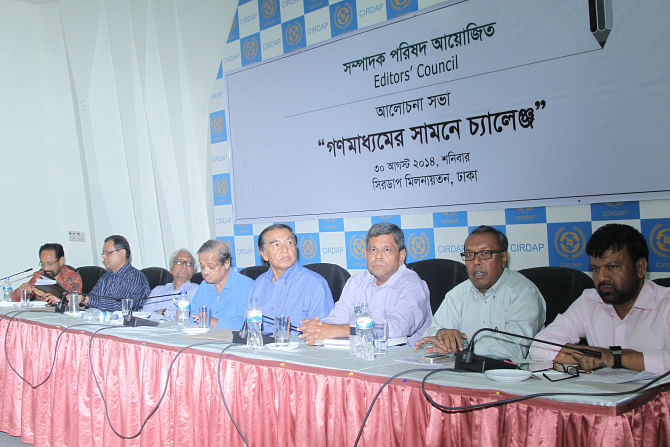It will gag media
It will gag media
Worried editors react to broadcast policy

Rejecting the national broadcast policy, newspaper editors, senior journalists and some noted personalities yesterday said such a policy was not acceptable, as it would gag the media and curb the freedom of journalists.
The policy would hinder the progress of the media that have helped democracy thrive and the economy grow since the restoration of democracy in the country in 1991. The media played a responsible role without the need for a new policy, they said at a discussion on challenges before the media.
The discussants criticised the provision that says every broadcast organisation must prepare “a charter of duties” and “an editorial policy” to be approved by the proposed independent commission.
The Editors' Council, a platform of editors of leading national dailies, organised the discussion at the Cirdap auditorium in the capital.
Mahfuz Anam, editor of The Daily Star, said evil intentions were there behind the formulation of the policy which would create obstacles to the flourishing of a free media and journalism.
The free and independent media is a big achievement in independent Bangladesh. “We strongly protest any attempts to undermine this achievement,” he said.
In giving TV licences, the government already provided the channels with certain mandatory guidelines, and private TV channels have been maintaining those and doing well for over a decade now. "Then what necessitated more restrictive policy now," he wondered.
He feared implementation of the new broadcast policy would make the broadcast media dull, and uninteresting channels would result in a shift of both audience and advertisements from home-grown TV channels to foreign ones.
“Any effort to control the media will slowly push the media towards death,” said Mahfuz Anam, also general secretary of the Council.
Editors and others in the broadcast media work within the limits determined by the constitution and laws. “Whenever there is a mistake, we ourselves correct it. Besides, there are the Press Council and laws that are applicable to the media. There was no need for a new policy,” he said.
Referring to some provisions, he said only in an undemocratic country are policies made to spell out what can be done and what not. “The broadcast policy will deal the biggest blow to creativity.”
Golam Sarwar, president of the Council and editor of the Daily Samakal, said the move to implement the policy has been stalled in the face of concerted protests and condemnation in discussions, seminars and newspapers.
On the information minister's statement that the policy was a guideline, he said, “We don't need such a guideline.”
He called upon all media people to prepare a code of conduct for them to follow. “We have our weaknesses. We sometimes do not use independent sources in news, and character assassination happens. We have to overcome that.”
The senior journalist urged the government to form an independent broadcast commission with qualified people who will not be puppets of the administration.
News Today Editor Reaz Uddin Ahmed termed the policy scary, and said it marks the beginning of many challenges that the country's media are going to face.
“This policy is a pre-censorship symptom which we can't accept. We must resist it,” he said.
Terming the policy a new trouble, Prof Serajul Islam Choudhury said it was alarming.
The media come under attack when there is no unity among journalists, he observed.
“The policy is unexpected as there is no state of emergency or martial law regime in the country … The media is a place of our confidence which will be destroyed if it is gagged.”
Monjurul Ahsan Bulbul, president of a faction of Bangladesh Federal Union of Journalists (BFUJ), said the formation of an independent broadcast commission is not needed if the policy determines what to do and what not.
He suggested that the media people prepare a draft which would help flourish creativity and good journalism, and stop bad journalism.
Shawkat Mahmud, president of a faction of the BFUJ, demanded cancellation of the new policy, and said there was no need for such a policy that had drawn widespread criticism from all quarters.
Barrister M Amir-ul Islam doubted whether those who encouraged the government to formulate the policy are its friends, as the policy tarnished its image.
Referring to the media's role in the development of the agriculture sector, he said a policy for the media should be made in such a way that it contributes to other areas such as educating children.
He termed ridiculous the provision that says accountability and transparency of the media will help establish good governance and human rights. The jurist said he had never heard of anything like that.
Prof Shafiul Alam Bhuiyan of Dhaka University said the beauty or ugliness of a policy is that anyone can describe it in different ways.
A policy has been formulated and it can still be amended, said Shafiul, who was a member of the committee that drafted the broadcast policy.
He said it should be determined how much freedom the media can enjoy.
The other speakers included Golam Rahman, pro-vice chancellor of the University of Liberal Arts of Bangladesh; Iftekharuzzaman, executive director of Transparency International Bangladesh; Shykh Seraj, director (news) of Channel-I; Syed Fahim Munaim, CEO and chief editor of Masranga Television; Syed Abdal Ahmed, general secretary of Jatiya Press Club; Mozammel Babu, chief editor of Ekattor Television; ZE Mamun of ATN Bangla and Munni Saha of ATN News.